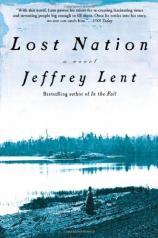Reading Group Guide
Discussion Questions
Lost Nation

1. In what ways can Lost Nation be seen as a reworking of an odyssey theme? Consider the voyages, the search for self, search for father, trials and testing, meeting monster figures, and glimpses of the idyllic. Think about these possibilities. What other examples of the quest theme do you find? How does the title lead us to examine communities as well as individuals that are lost in the novel?
2. Throughout the novel, Lent holds the idea of freedom up to the light of inquiry. In some ways Blood is the ultimate free man, free to abandon his family, to explore depravity, to reinvent himself over and over. His separation from others is entirely of his own making. Yet he consistently declares that no man is free: the "exercise of free will was a mere mask for destiny or fate." Consider this recurring paradox in Lost Nation. Sally, in contrast, begins in literal bondage, tied to the back of an oxcart. How does she attempt to alter her destiny? Does she succeed? What other characters try to grapple with their destinies?
3. At one point we learn that Blood had spotted Sally in the brothel a year before he returned and calculated to win her in a card game. Sally herself "guessed he saw her as something he might make amends to, amends for a fester tracked back to before she was even born" (p. 175). Was he motivated to save her, or did he sense, perhaps in his subconscious, that she was to be the instrument of his peace and redemption? Consider their relationship in light of Blood's own daughter. Is he seeking to bury those memories or re-create them?
4. Blood appears in the somewhat God-fearing Indian Stream country as a stranger with a murky past only whispered about. He uses only a single name, furthering his role as a symbolic one. One thinks of a Hawthorne tale in which an Outsider forces people to confront their own hidden flaws.
In what other ways do you see Blood as a symbolic character? Or do you see him more as all too human, an Everyman perhaps? Could he be an unwitting emissary for good as well as bad? What happens to Indian Stream when Blood and Sally come, and what does it say about communities and their ability to adapt to the unknown?
5. From Blood's grandfather to Sally's grandchild, there are circles turning back on themselves in the novel. What is the role of Blood's children in this respect? Of Sally's miracle child and grandchild? Another cycle in the book is entering the heart of darkness and emerging through some kind of grace or redemption. What are examples of this cycle?
6. Blood is at least twice described in images that recall Christ. One is his riding on a mule with a child throwing pebbles at him (p.213). Another is Blood's injury "as if he were nailed through to the floor" (p. 254). He himself would be the first to deny the analogy. How do you account for the martyr imagery in this complex reprobate?
7. Huge, black, mythic in his loyalty and his power, Blood's dog Luther plays a central role in the novel. He can appear diabolic to others, but to Blood, and eventually Sally, he becomes family and ally. Consider the many moments when he is a protector to the couple. Mysteriously he intuits their needs and reacts. To what degree does his demise prefigure Blood's fate?
8. What are we to make of the ethics, the morality of Blood? There are many examples of his violence, whoring, abuse of Sally, and other bestial actions in his past. Blood can be utterly lacking in charity (for instance, his refusal to offer any aid to Simon Crane, which drives that man to a grisly end). How can Blood's intransigence be justified, if at all?
There are also moments of his tender caring for others (for the wounded Deacon, for Sally) and outright bravery, such as stopping the fighting, going alone as emissary to Hutchinson, cleaning and dressing his horrific wound. What in the end is your assessment of this complex character? Certainly he is not conventionally virtuous, but we miss him when he is not there; his sons do not fill the void. Discuss these ideas.
9. In a dark, often bleak tale, we still find flashes of humor. The humor may be rueful, ironic, on the edge of horror. For example, faced with Wilson's putrefied skull (p. 61), Simon Crane's comment reminds us of Shakespeare's fools or perhaps Hamlet: "Why he's in two places at once. He's right here alongside where I can see everything he's up to. But he is also back to the camp, keeping track of things there." Can you think of other examples of humor in the book? Does the wit serve as a springboard to serious issues?
10. Love and forgiveness are states of grace that occur at certain points in the story. When? Which characters also need to forgive themselves? How is the process facilitated? When, in this often dark tale, is love achieved, even if it is temporary? How is it threatened or destroyed? Which characters, having lost love, are able to reconstitute it?
11. The narrator casts a jaundiced eye on human behavior for the most part, but lyrical evocations of nature (land, waters, sky, seasons, plants) are celebratory-often like Eden. Are we meant to conclude that some redemption is possible through a close association with the natural world? Which descriptions of nature are memorable to you?
Consider particularly Sally's responses to the natural world; even Blood finds a remarkable peace in the physical work of turning over their first garden. Both Blood and Sally find in the new garden "the grace of simple work. And the attendant grace of solitude" (p. 67). It is the land that confers these benefits upon them, rather than people. What is Lent suggesting about human beings and nature?
12. The heart of darkness recurrent in the novel is at one point described by Blood (explaining that where Sally came from, she is better off now, with him, despite her occupation). "There are places in this world where a body just starts out flat and goes lower and lower. There are places that don't have any doors, no ways out." Discuss this existential metaphor of no exit for various characters. At what point does the image become concrete, an actuality for Blood?
13. Indian Stream is betwixt and between. The nebulous legal status of the land between Canada and the United States reflects ambiguity in the world of men. The people of the community are afraid of lawlessness and their precarious claims to the land, yet the threat of "the law," calling in the sheriff, looms as ominously as the Indians' incursions. In this land of wild, ungoverned territory, is it clear that "civilization" is going to do it much good?
14. Emil Chase is introduced as a leader of the Indian Stream community. His antipathy to Blood leads us to expect a High Noon confrontation. Chase and Blood are near the same age, and they share similar frontier traits-both "practical, thrifty, hard-working and sober." Chase, however, regards himself as "a whole man. While Blood knew otherwise of himself."
Discuss the roles of the two men as they intersect. Can they be seen as doubles, as doppelganger characters? "Each recognized the other as adversary, opponent, as the one man in this place who, save by chance or accident, might destroy the other if either chose" (p. 75). What are the consequences of their relationship in the novel?
15. Sally, born in shame and raised to debauchery, is tethered to the back of Blood's cart like an animal or the slave she is. She herself claims she's "tougher'n dried cod," yet retains the freshness and naïveté of a girl: "her life so unexpected ingenuous with delight" (p. 20). For Blood, Sally provokes "a tenderness that he thought was gone long since. Determined she would never know it, he now thought of her as something out of providence. Perhaps, he thought, nothing more than yet another test of his soul" (p. 19).
Sally, illiterate, debased, emerges as a survivor, as Blood always predicted, especially after she shot the wolf. Consider her multiple roles in the novel, from slave-prostitute to nurturer to heroine. Sally is part of a tradition of decent-indecent women. One thinks of Belle Watkins in Gone with the Wind and Mrs. Waters in Tom Jones. Can you think of others in books or movies?
16. At the center of the novel, Lent creates a concatenation of events that hurtle to inevitable ends. Each incident acts as a portent and prod for the next. There is the accidental shooting and then desecration of the Indian, hung to swing as a warning-an act regarded by Blood as foolhardy provocation. Equally disturbing is the disappearance of the body ("no footprints") and next the decamping of the five Canadian inhabitants who "departed soundless in the dark." Then is the deadly confrontation between Laberge and Bacon, ending in the desecration of yet another body-and more violent consequences. What are Sally's and Blood's reactions, and how do the events affect their relationship? What about the larger community?
17. Our moral sense is chilled by Sally's occupation, both her businesslike acceptance and Blood's encouraging her to continue, even as their own relationship develops. How do we deal with their actions? Or, conversely, do we need to suspend ordinary judgment in this book? Why?
Sally, in the marshland, says, "There is nothing simple in this life" (p. 264 ). What are her thoughts at that point about the two boys and about Blood, whom she has abandoned? The narrator says, "Still, she would not leave it thus." How do you (and how does she) explain her defining action?
18. We recall Emil Chase's accusing Blood of hubris, of overconfidence: "How did you get educated so far beyond right or wrong?" (p. 77). Later, when Blood is incarcerated, he is sure that "he had done nothing money could not smooth." (p. 216). How accurate is his assessment? Consider the later scene with Blood and his bags of coins at the stream. How is the scene richly symbolic?
19. Both Blood and Sally claim to believe "past is past." Are they able to make that statement true in their own lives? How?
20. Futility and waste mark the efforts of the people of Indian Stream even after enormous efforts on their part to establish their community. Indeed, they regarded themselves as virtuous, and yet many fared no better than the sinner Blood. How can human beings persevere if there is no ultimate reward for virtue ? How does Blood ultimately evaluate his own life?
21. "It was some mystery that led a person from one fate to another." Moving on and abandonment are motifs that run through the novel. It is in an idyllic late August marshland with red-winged blackbirds, "the light glancing off the still ponds, the sweet smell of the moist earth," that Sally realized "something was possible" (p. 175). She was poised to move on with her sockful of money, despite her reassurances to Blood that she was not going to bolt. What other characters, major and minor, find it necessary to pack up and leave? What are the results?
Lost Nation
- Publication Date: March 10, 2003
- Paperback: 384 pages
- Publisher: Grove Press
- ISBN-10: 080213985X
- ISBN-13: 9780802139856








